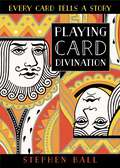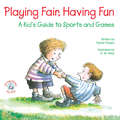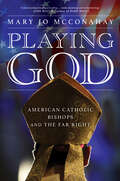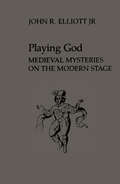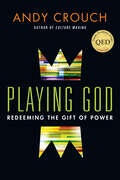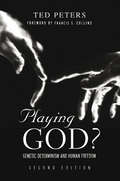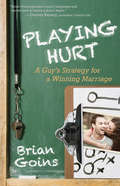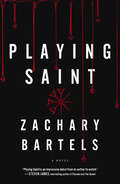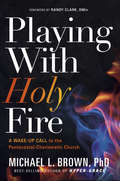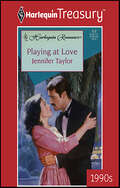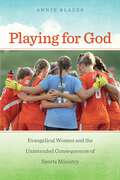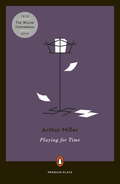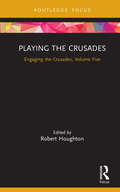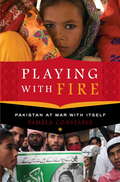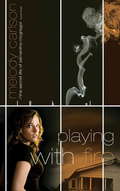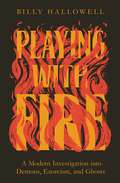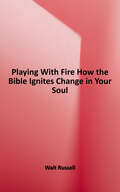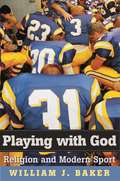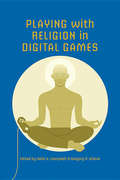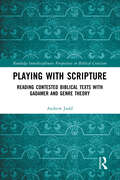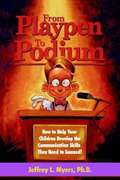- Table View
- List View
Playing Card Divination: Every Card Tells a Story
by Stephen BallDevelop your own path of wisdom with a simple deck of cards.Turn a standard deck of playing cards into a colorful divinatory system filled with inspiration, adventure, insight, and advice. In Playing Card Divination, each card from ace through king represents a mythic role (Hunter, Lover, Healer, etc.) and each of the four suits gives an action for that role (Promise, Gambit, Folly, Triumph). This brings a unique meaning to every combination—for example, the three of hearts becomes "Healer's Triumph," representing gratitude, recognition, and teamwork. For each card, author Stephen Ball provides a brief imaginative story that helps you understand and remember the meaning. You will also discover examples of readings with one card, two cards, and five cards as well tips for interpreting unexpected combinations.This approach to reading playing cards is fresh and updated for today's reader. Whether you want to read for yourself and your friends or for clients, this book shows how to discover new perspectives that support positive transformation.
Playing Fair, Having Fun
by R. W. Alley Daniel GrippoSports and games help kids grow strong in mind and body. And they teach kids about life--about competitive pressure, the time crunch for families, and the risks of computer and internet games to consider. Share this book with the kids you care about, so that the games they play will be fun, fair, and life-giving. 32 pages.
Playing God: American Catholic Bishops and The Far Right
by Mary Jo McConahay&“A fascinating, investigative dive . . . both alarming and enlightening.&” — Jane Mayer, author of Dark Money The definitive account of how a group of American Catholic bishops are using &“dark money&” and allying with ultra-right evangelicals in an attempt to remake America . . . Seasoned Catholic journalist and former war correspondent Mary Jo McConahay tells the story of how the United States Conference of Catholic Bishops have become one of the most formidable and reactionary forces in America — by campaigning to alter democratic institutions under the guise of religious liberty, and allying with major right-wing contributors such as the Kochs. In fact, many of the bishops—two-hundred and twenty-nine men, almost all white and beyond middle age—are such staunch opponents of Pope Francis that some US Catholics fear a schism with Rome. The influence of these bishops can be traced in recent news stories—such was when they maneuvered to deny the Eucharist to pro-abortion politicians like President Biden. With their lay partners, the bishops also help shepherd cases into the Supreme Court that change the law of the land, as with Roe v. Wade. But as McConahay details, that&’s just the tip of the iceberg. In an investigation reminiscent of Jane Mayer&’s Dark Money, she uncovers an ominous and long-term political strategy of attacking secular, liberal democracy by waging war on democratic norms and institutions.
Playing God: Medieval Mysteries on the Modern Stage
by John R. ElliottReligious drama was one of the most vital art forms of the medieval era. In medieval mystery plays, God appeared as one of the characters, along with angels, saints, the devil, and others. Until very recently however, the revival of interest in medieval culture has not included drama, beacuse of a lingering fear of blasphemy associated with the representation of God on the stage. In Britain this fear was the legacy of a theatrical censorship which has been exercised by the Lord Chamberlain's office for hundreds of years. Since that power was abolished in 1968, medieval religious, or mystery, plays are once again appearing on the stages of many countries. John R. Elliott Jr. studies the modern context of this important medieval genre. He begins by describing general attitudes towards religious drama from the time of the reformation, the popularity of the Oberammergaru Passion Play in Victorian times, and specific attempts by producers to overcome official hostility to religious plays. He traces the history of the major modern productions of the mystery cycles, such as the York Festival and the Bristol University performance of the Cornish Ordinalia, and provides information about the careers of the two leading pioneers of modern mystery-play production. The concluding chapter discusses the chief practical and aethetic problems involved in staging mystery plays for modern audiences, and assesses the overall importance of their revival in the larger context of British there today.
Playing God: Redeeming the Gift of Power
by Andy CrouchMidwest Publishing Association Award of Excellence Outreach Magazine Resource of the Year ForeWord Book of the Year Award Honorable Mention Power corrupts—as we've seen time and time again. People too often abuse their power and play god in the lives of others. Shady politicians, corrupt executives and ego-filled media stars have made us suspicious of those who wield influence and authority. They too often breed injustice by participating in what the Bible calls idolatry. Yet power is also the means by which we bring life, create possibilities, offer hope and make human flourishing possible. This is "playing god" as it is meant to be. If we are to do God's work—fight injustice, bring peace, create beauty and allow the image of God to thrive in those around us—how are we to do these things if not by power? With his trademark clear-headed analysis, Andy Crouch unpacks the dynamics of power that either can make human flourishing possible or can destroy the image of God in people. While the effects of power are often very evident, he uncovers why power is frequently hidden. He considers not just its personal side but the important ways power develops and resides in institutions. Throughout Crouch offers fresh insights from key biblical passages, demonstrating how Scripture calls us to discipline our power. Wielding power need not distort us or others, but instead can be stewarded well. An essential book for all who would influence their world for the good.
Playing God?: Genetic Determinism and Human Freedon
by Ted PetersSince the original publication of Playing God? in 1996, three developments in genetic technology have moved to the center of the public conversation about the ethics of human bioengineering. Cloning, the completion of the human genome project, and, most recently, the controversy over stem cell research have all sparked lively debates among religious thinkers and the makers of public policy. In this updated edition, Ted Peters illuminates the key issues in these debates and continues to make deft connections between our questions about God and our efforts to manage technological innovations with wisdom.
Playing Hurt: A Guy's Strategy for a Winning Marriage
by Brian GoinsA marriage book that husbands will actually want to read!Everyone admires people who play hurt, from the superstar athlete to the journeyman player who finishes the game even when hurt, sick, or falling apart. Everyone looks up to these athletes and wants to mimic their "never give up" attitude. Except when it comes to marriage. Most husbands are willing to take a bullet for their wives in a life-and-death situation; but when his bride fires the bullet--hurls an insult, disrespects him in public, ignores his foreplay in private--he'd rather throw in the towel than play through the pain.Playing Hurt is a biblical playbook for marriage that speaks in the language most men understand--the language of sports. Using a sports analogy to explain the motivation, means, and methods of playing hurt, author Brian Goins shows men how to overcome the temptation to stay on the bench. Playing Hurt is more about inspiration than instruction. It's about finding the motivation to stay in the game, despite the pain. It's about becoming like the One who knew more about nails and thorns than any superstar athlete. Using Ephesians 5 as a biblical basis, this book will call husbands to be the heros they long to be--men who play hurt in order to win at marriage.
Playing Saint: A Novel
by Zachary BartelsYesterday, Parker Saint&’s only concern was his swiftly rising star power. Today, he&’s just trying to stay alive. Parker Saint is living the dream. A cushy job at a thriving megachurch has him on the verge of becoming a bestselling author and broadcast celebrity—until life takes an abrupt turn that lands him on the wrong side of the law. To avoid a public scandal, he agrees to consult with the police on a series of brutal murders linked by strange religious symbols scrawled on each victim.Parker tries to play the expert, but he is clearly in over his head. Drawn ever deeper into a web of intrigue involving a demanding detective, a trio of secretive Vatican operatives, and a centuries-old conspiracy to conceal a mysterious relic, he realizes for the first time that the battle between good and evil is all too real—and that the killer is coming back . . . this time for him.&“A thought-provoking exploration into the power of faith and the reality of evil. Filled with memorable characters and tight writing, Playing Saint is an impressive debut from an author to watch.&” —Steven James, bestselling author of Placebo and The Queen
Playing With Holy Fire: A Wake-Up Call to the Pentecostal-Charismatic Church
by Michael L. BrownOver the last hundred-plus years the Pentecostal-Charismatic church has witnessed miraculous conversions. From the Azusa Street Revival, which began in 1906, a movement has grown to bring more people to Jesus than any other movement in history. While secularism continues to be on the rise in today's society, many areas of the world still experience church growth, thanks to Pentecostal-Charismatic Christians. But the Pentecostal-Charismatic church is also plagued with sexual immorality, financial corruption, doctrinal error, personal flakiness, spiritual gullibility, prophetic abuse, and more. In many ways the state of the church today is not too different from how it was long ago in Corinth. To make matters worse, the church hides these acts under the cloak of liberty in the Holy Spirit. Michael Brown sounds a wake-up call to the church and addresses some of the most glaring problems, from inaccurate prophetic words that obscure true ones to ministries using scripturally armed marketing techniques in order to manipulate believers into giving. Brown shows us why we must clean up house so the church can grow, flourish, and fulfill God's kingdom purposes.
Playing at Love
by Jennifer TaylorTwo-week fiancée...Louise couldn't believe her good luck in winning a luxury trip to Florida. And meeting hunky tycoon Wyatt Lord had seemed and unexpected bonus. Unfortunately, it soon became clear Wyatt wasn't interested in romance-only business. He wanted Louise but only as a temporary fiancée to secure a deal. Even pretending to be Wyatt's intended bride was tempting-if only Louise could convince him that this was one game he should play for keeps!
Playing for God: Evangelical Women and the Unintended Consequences of Sports Ministry (North American Religions)
by Annie BlazerWhen sports ministry first emerged in the 1950s and 1960s, its founders imagined male celebrity athletes as powerful salespeople who could deliver a message of Christian strength: “If athletes can endorse shaving cream, razor blades, and cigarettes, surely they can endorse the Lord, too,” reasoned Fellowship of Christian Athletes founder Don McClanen. But combining evangelicalism and sport did much more than serve as an advertisement for religion: it gave athletes the opportunity to think about the embodied experiences of sport as a way to experience intimate connection with the divine. As sports ministry developed, it focused on individual religious experiences and downplayed celebrity sales power, opening the door for female Christian athletes to join and eventually dominate sports ministry. Today, women are the majority of participants in sports ministry in the United States. In Playing for God, Annie Blazer offers an exploration of the history and religious lives of Christian athletes, showing that evangelical engagement with popular culture can carry unintended consequences. When sport became an avenue for embodied worship, it forced a reckoning with evangelical teachings about the body. Female Christian athletes increasingly turned to their own bodies to understand their religious identity, and in so doing, came to question evangelical mainstays on gender and sexuality. What was once a male-dominated masculinist project of sports engagement became a female-dominated movement that challenged evangelical ideas on femininity, marriage hierarchy, and the sinfulness of homosexuality. Though evangelicalism has not changed sporting culture, for those involved in sports ministry, sport has changed evangelicalism.
Playing for Time (Penguin Plays)
by Arthur MillerA searing drama of the Holocaust--and the remarkable, moving story of the Auschwitz Women's Orchestra Paris, 1942. Fania Fénelon, a popular Jewish nightclub singer, is arrested by the occupying Germans. <P><P>Sent to Auschwitz in a packed freight-car, shorn of her hair, tattooed with an identifying number, starved, and subjected to harsh labor, she loses all traces of her former self. But her life at the camp changes dramatically when she is drafted into the Women's Orchestra, a desperate little ensemble that marches the prisoners out to work and gives concerts for the German high brass. Led by Alma Rosé, a sternly ambitious German-Jewish conductor who knows that her job is a matter of life and death, Fania and her fellow musicians must confront the horror taking place around them while pushing themselves to create beauty in the midst of despair. <P> Based on Fania Fénelon's memoir of the same name, Arthur Miller's Playing for Time was first produced as a CBS television drama starring Vanessa Redgrave before being adapted for the stage.
Playing the Crusades: Engaging the Crusades, Volume Five (Engaging the Crusades)
by Robert HoughtonEngaging the Crusades is a series of volumes which offer windows into a newly emerging field of historical study: the memory and legacy of the crusades. Together these volumes examine the reasons behind the enduring resonance of the crusades and present the memory of crusading in the modern period as a productive, exciting, and much needed area of investigation. This volume considers the appearance and use of the crusades in modern games; demonstrating that popular memory of the crusades is intrinsically and mutually linked with the design and play of these games. The essays engage with uses of crusading rhetoric and imagery within a range of genres – including roleplaying, action, strategy, and casual games – and from a variety of theoretical perspectives drawing on gender and race studies, game design and theory, and broader discussions on medievalism. Cumulatively, the authors reveal the complex position of the crusades within digital games, highlight the impact of these games on popular understanding of the crusades, and underline the connection between the portrayal of the crusades in digital games and academic crusade historiography. Playing the Crusades is invaluable for scholars and students interested in the crusades, popular representations of the crusades, historical games, and collective memory.
Playing with Fire
by Pamela ConstableA volatile nation at the heart of major cultural, political, and religious conflicts in the world today, Pakistan commands our attention. Yet more than six decades after the country's founding as a Muslim democracy, it continues to struggle over its basic identity, alliances, and direction. In Playing with Fire, acclaimed journalist Pamela Constable peels back layers of contradiction and confusion to reveal the true face of modern Pakistan.In this richly reported and movingly written chronicle, Constable takes us on a panoramic tour of contemporary Pakistan, exploring the fears and frustrations, dreams and beliefs, that animate the lives of ordinary citizens in this nuclear-armed nation of 170 million. From the opulent, insular salons of the elite to the brick quarries where soot-covered workers sell their kidneys to get out of debt, this is a haunting portrait of a society riven by inequality and corruption, and increasingly divided by competing versions of Islam.Beneath the façade of democracy in Pakistan, Constable reveals the formidable hold of its business, bureaucratic, and military elites--including the country's powerful spy agency, the ISI. This is a society where the majority of the population feels powerless, and radical Islamist groups stoke popular resentment to recruit shock troops for global jihad. Writing with an uncommon ear for the nuances of this conflicted culture, Constable explores the extent to which faith permeates every level of Pakistani society--and the ambivalence many Muslims feel about the role it should play in the life of the nation.Both an empathic and alarming look inside one of the world's most violent and vexing countries, Playing with Fire is essential reading for anyone wishing to understand modern Pakistan and its momentous role on today's global stage.From the Hardcover edition.
Playing with Fire (The Secret Life of Samantha Mcgregor, Book #3)
by Melody CarlsonIf your vision led you straight into the fire,would you follow it anyway?Samantha's brother, Zach, is finally home after a ninety-day rehab for his meth addiction, and life seems to be getting back to normal. That is, until Sam starts having dreams about dangerous situations involving drugs. But her visions are so vague that she doesn't know who needs help. Of course she's worried about Zach staying clean, especially since he's hanging with the wrong crowd. But the whole school seems to be buzzing about drugs, and Sam doesn't know who's using and who's not. What is wrong with these people anyway?Then Sam has a vision of a burning cabin, and this time someone has been shot. Convinced that Zach is involved somehow, Sam chooses to leave Detective Ebony Hamilton out of the loop. If Zach really is involved, this will land him in jail for sure! But her own investigation is getting too hot to handle, and Sam must decide whether to risk getting Zach in trouble with the law- or ultimately risk his life.From the Trade Paperback edition.
Playing with Fire: A Modern Investigation into Demons, Exorcism, and Ghosts
by Billy Hallowell&“Provocative, insightful, and enlightening—a foray into an often-neglected topic that merits more attention than it typically receives.&”--Lee Strobel, New York Times bestselling author of The Case for ChristWhat is Our Fascination with the Other Side?Join investigative reporter Billy Hallowell as he delves into the strange phenomena of supernatural activity. Themes of demonic possession, exorcism, and ghosts have overtaken Hollywood, with countless films and TV shows delving into the age-old struggle against evil. But the question is why?Even with so much focus on the topic, there seems to be very little public knowledge and discussion about the theology and real-life claims surrounding demons. Quite often, many people remain silent about their experiences or resort to quietly whispering about what they&’ve seen, heard, or felt for fear of being labeled as crazy. The truth is, even pastors, priests, and clergy who have observed firsthand accounts of possession and deliverance can succumb to the strange and terrifying effects of intense spiritual warfare.For people of faith, Playing with Fire addresses these core questions:Are demons active today?If they do indeed exist, what are they? Fallen angels? Nephilim?Can demons inhabit human beings?According to the Bible, can people die and remain behind as &“ghosts&”?Playing with Fire explores the theological underpinnings surrounding the supernatural. Relying on firsthand accounts, newspaper reports, and Christian experts, Hallowell takes readers through the various views and perspectives surrounding supernatural activity.
Playing with Fire: How the Bible Ignites Change in Your Soul
by Walt RussellBible scholar Walt Russell insists that studying the Scriptures properly is like playing with fire―a fire that can ignite dramatic change in our souls. With an intelligent, engaging style, Russell puts the tools in your hands that enable you to study different styles of biblical writing in depth. And this fuller understanding of God’s Word unleashes a heart-transforming power that burns away your defenses like fire, bringing radical change to your life.
Playing with God: Religion and Modern Sport
by William J. BakerThe spectacle of modern sport displays all the latest commercial and technological innovations, yet age-old religious concerns still thrive at the stadium. Coaches lead pre-game and post-game prayers, athletes give God the credit for home runs and touchdowns, and fans wave signs with biblical quotations and allusions. Like no other nation on earth, Americans eagerly blend their religion and sports. Playing with God traces this dynamic relationship from the Puritan condemnation of games as sinful in the seventeenth century to the near deification of athletic contests in our own day. <P><P>Early religious opposition to competitive sport focused on the immoderate enthusiasm of players and spectators, the betting on scores, and the preference for playing field over church on Sunday. Disapproval gradually gave way to acceptance when "wholesome recreation" for young men in crowded cities and soldiers in faraway fields became a national priority. Protestants led in the readjustment of attitudes toward sport; Catholics, Jews, Mormons, and Muslims followed. The Irish at Notre Dame, outstanding Jews in baseball, Black Muslims in the boxing ring, and born-again athletes at Liberty University represent the numerous negotiations and compromises producing the unique American mixture of religion and sport.
Playing with God: Religion and Modern Sport
by William J. BakerThe spectacle of modern sport displays all the latest commercial and technological innovations, yet age-old religious concerns still thrive at the stadium. Coaches lead pre-game and post-game prayers, athletes give God the credit for home runs and touchdowns, and fans wave signs with biblical quotations and allusions. Like no other nation on earth, Americans eagerly blend their religion and sports. Playing with God traces this dynamic relationship from the Puritan condemnation of games as sinful in the seventeenth century to the near deification of athletic contests in our own day. Early religious opposition to competitive sport focused on the immoderate enthusiasm of players and spectators, the betting on scores, and the preference for playing field over church on Sunday. Disapproval gradually gave way to acceptance when "wholesome recreation" for young men in crowded cities and soldiers in faraway fields became a national priority. Protestants led in the readjustment of attitudes toward sport; Catholics, Jews, Mormons, and Muslims followed. The Irish at Notre Dame, outstanding Jews in baseball, Black Muslims in the boxing ring, and born-again athletes at Liberty University represent the numerous negotiations and compromises producing the unique American mixture of religion and sport.
Playing with Religion in Digital Games
by Heidi A. Campbell Gregory P. GrieveShaman, paragon, God-mode: modern video games are heavily coded with religious undertones. From the Shinto-inspired Japanese video game Okami to the internationally popular The Legend of Zelda and Halo, many video games rely on religious themes and symbols to drive the narrative and frame the storyline. Playing with Religion in Digital Games explores the increasingly complex relationship between gaming and global religious practices. For example, how does religion help organize the communities in MMORPGs such as World of Warcraft? What role has censorship played in localizing games like Actraiser in the western world? How do evangelical Christians react to violence, gore, and sexuality in some of the most popular games such as Mass Effect or Grand Theft Auto? With contributions by scholars and gamers from all over the world, this collection offers a unique perspective to the intersections of religion and the virtual world.
Playing with Scripture: Reading Contested Biblical Texts with Gadamer and Genre Theory (Routledge Interdisciplinary Perspectives on Biblical Criticism)
by Andrew JuddThis book puts a creative new reading of Hans-Georg Gadamer’s philosophical hermeneutics and literary genre theory to work on the problem of Scripture. Reading texts as Scripture brings two hermeneutical assumptions into tension: that the text will continually say something new and relevant to the present situation, and that the text has stability and authority over readers. Given how contested the Bible’s meaning is, how is it possible to ‘read Scripture’ as authoritative and relevant? Rather than anchor meaning in author, text or reader, Gadamer’s phenomenological model of hermeneutical experience as Spiel (‘play’) offers a dynamic, intersubjective account of how understanding happens, avoiding the dead end of the subjective–objective dichotomy. Modern genre theory addresses some of the criticisms of Gadamer, accounting for the different roles played by readers in different genres using the new term Lesespiel (‘reading game’). This is tested in three case studies of contested texts: the recontextualization of psalms in the book of Acts, the use of Hagar’s story (Genesis 16) in nineteenth-century debates over slavery and the troubling reception history of the rape and murder in Gibeah (Judges 19). In each study, the application of ancient text to contemporary situation is neither arbitrary, nor slavishly bound to tradition, but playful.
Playing with Scripture: Reading Contested Biblical Texts with Gadamer and Genre Theory (Routledge Interdisciplinary Perspectives on Biblical Criticism)
by Andrew JuddThis book puts a creative new reading of Hans-Georg Gadamer’s philosophical hermeneutics and literary genre theory to work on the problem of Scripture. Reading texts as Scripture brings two hermeneutical assumptions into tension: that the text will continually say something new and relevant to the present situation, and that the text has stability and authority over readers. Given how contested the Bible’s meaning is, how is it possible to ‘read Scripture’ as authoritative and relevant? Rather than anchor meaning in author, text or reader, Gadamer’s phenomenological model of hermeneutical experience as Spiel (‘play’) offers a dynamic, intersubjective account of how understanding happens, avoiding the dead end of the subjective–objective dichotomy. Modern genre theory addresses some of the criticisms of Gadamer, accounting for the different roles played by readers in different genres using the new term Lesespiel (‘reading game’). This is tested in three case studies of contested texts: the recontextualization of psalms in the book of Acts, the use of Hagar’s story (Genesis 16) in nineteenth-century debates over slavery and the troubling reception history of the rape and murder in Gibeah (Judges 19). In each study, the application of ancient text to contemporary situation is neither arbitrary, nor slavishly bound to tradition, but playful.
Playpen to the Podium
by Jeff Myers"Your home," writes Jeff Myers, "can be a living, breathing communication workshop far better than any class your child will ever take." "This book contains all of the tools you need for the task of giving your child the communication advantage in every area of life. You will discover how to help your child become more comfortable in social situations, think more clearly, read and write more effectively, take a stand more boldly, analyze more carefully, and speak more articulately."
Pleasant Hill and Its Shakers
by Thomas D Clark F Gerald HamThe Shakers at Pleasant Hill had a vital impact for more than six decades on the development of Kentucky. Settling in Central Kentucky in 1805 to establish a religious communal village, they brought a standard of excellence and innovativeness that reached far beyond their group. Since its inception in 1961 as a nonprofit, educational corporation, Shakertown at Pleasant Hill, Kentucky, Inc., has striven to fulfill its charter responsibilities to preserve and maintain twenty-seven of the nineteenth century Shaker buildings extant, and to interpret the 1805-1910 history they depict. These structures range in size from a massive forty-room stone dwelling to a three-story brick office, an admirable example of "Shaker Georgian", to a small clapboard shop. Today, a variety of adaptative uses offers the visitor a range of experiences and services: exhibition tour, museum, river cruise, overnight accommodations, dining, and craft sales shop. This book's author, Dr. Thomas D. Clark, has been intimately associated with the Shaker Village of Pleasant Hill restoration efforts from the beginning and has watched the progress with keen interest. He narrates the story of these fascinating people with knowledge, warmth, humor, and dramatic animation. Few outdoor history museums have been blessed with having a noted historian and writer of Dr. Clark's caliber on the scene to recount their history.
Pleasant Hill and Its Shakers
by Thomas D. Clark F. Gerald HamFROM THE BACK COVER The Shakers at Pleasant Hill had a vital impact for more than six decades on the development of Kentucky. Settling in Central Kentucky in 1805 to establish a religious communal village, they brought a standard of excellence and innovativeness that reached far beyond their group. nces and services: exhibition tour, museum, river cruise, overnight accommodations, dining, and craft sales shop. This book's author, Dr. Thomas D. Clark, has been intimately associated with the Shaker Village of Pleasant Hill restoration efforts from the beginning and has watched the progress with keen interest. He narrates the story of these fascinating people with knowledge, warmth, humor, and dramatic animation. Few outdoor history museums have been blessed with having a noted historian and writer of Dr. Clark's caliber on the scene to recount their history
